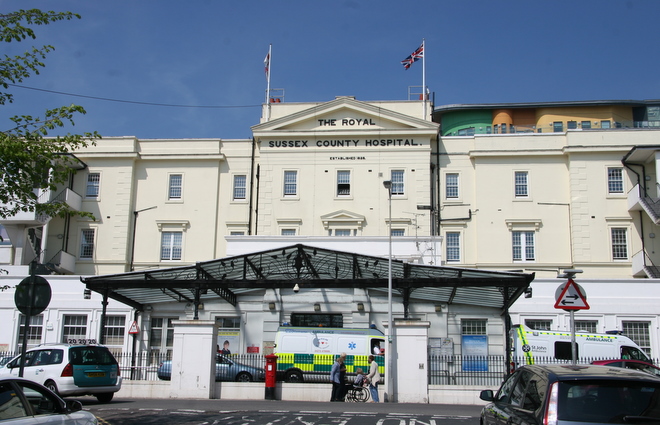The Brighton hospital where a patient died after drinking cleaning fluid has been criticised in a report by the official health watchdog.
Staff were still storing potentially poisonous cleaning fluids in kitchens despite being reminded to keep it in dedicated locked cupboards when inspectors checked up.
The Care Quality Commission (CQC) inspected the hospital trust – Brighton and Sussex University Hospitals – after Joan Blaber died at the Royal Sussex County Hospital in Kemp Town.
Mrs Blaber, 85, died in September and the CQC sent in inspectors for an unannounced visit in October.
Its report is published this morning (Thursday 17 May) and can be read here.
The chief inspector of hospitals told the trust, which runs the Royal Sussex, “that it must take steps to ensure that its patients are protected from potentially hazardous cleaning materials”.
The CQC said: “During the inspection the CQC found that housekeeping assistants had a good knowledge of the regulations relating to Control of Substances Hazardous to Health (CoSHH) cleaning products and had recently received refresher training.
”Although nursing staff received training in the CoSHH regulations as part of their mandatory training programme, some were not clear about their responsibilities.
“There was not a system in place which gave assurance that Control of Substances Hazardous to Health information had been read or understood by staff using the substances.
“Training materials provided by the trust made it clear that there was no legitimate reason to decant cleaning products into other containers.
“Although staff were aware of this, some cleaning staff said there had been occasions where this had happened without authorisation.
“At the time of the inspection the trust had removed green water jugs which had been in place to support people with dementia and replaced them with clear jugs that meant it was possible to see the liquid inside the jug.
“The trust had also instructed all the codes on the cleaning cupboard doors to be changed. However, inspectors found that door codes had not been changed at the time of inspection.
“Products were not always stored securely but found stored in unlocked utility rooms and kitchens and on three wards that inspectors visited access codes were written on door or doorframes close to digital locks. They also found unattended cleaning trolleys containing hazardous substances.

Amanda Stanford, CQC Deputy Chief Inspector of Hospital inspection for the South, said: “The regulations governing the safe use of these cleaning products are there to protect people from harm.
“During our inspection we found that these chemicals were not always being kept safely.
“We have told the trust they must ensure all products that are subject to the CoSHH regulations are stored securely.
“They must also introduce a system which gives assurance that information relating to all substances subject to Control of Substances Hazardous to Health is available in every work area.
“This information must be complete and accurate, and staff must be able to understand it.
“Nursing staff too must be aware of the regulations and their responsibilities with regard to safe storage and use of these products.”
CQC has told the trust that it must provide a report setting out how it will meet the regulations. Inspectors will return in due course to check that the improvements have been made.
Dr Rob Haigh, the trust’s medical director, said: “This inspection followed the death of a patient in September 2017 at the Royal Sussex County Hospital following an incident on a medical ward. Our thoughts are with the patient’s family.
“The incident was reported straight away and we took immediate, trust-wide action to prevent the same thing happening again.
“In the seven months since the CQC’s inspection, we have taken significant steps to improve the way we manage potentially hazardous substances both in terms of staff training and the way these substances are stored and used, addressing the points published in today’s report.”
A full inquest into Mrs Blaber’s death will be held in the autumn.









Good leadership isn’t just about issuing instructions to staff. It’s also about providing management and support, including checking that instructions are carried out, to ensure everyone’s doing the right things. For a long time we’ve had weak leadership and poor management at the Royal Sussex, with favourites, bullying and other bad practices.